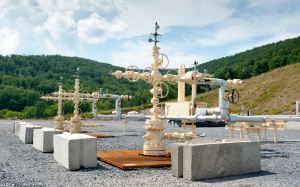U.S. Independence from Arab Oil Imports
There is little that is better suited to highlighting the significance of the shale revolution in North America than Qatar’s decision, as the world’s leading exporter of liquefied natural gas (LNG), to move into North American gas production in April 2013. Together with their British partner Centrica, the Qataris were happy to invest one billion U.S. dollars to join in the brave new (gas) world.
In Europe, public debate is focused less on the opportunities than on the risks of shale gas and oil extraction, also known as “fracking”. However, in these areas the strategic significance of unconventional oil and gas production and the resulting shift in geopolitical power has simply not yet been sufficiently understood.
Competitive advantages
Thanks to lower gas prices, the U.S. has gained a competitive advantage over Europe and Asia, with more energy-intensi
ve industries in particular reaping the benefits.
Thus, German chemical giant BASF has announced its intention to build three new factories in the U.S. In view of this development, what will become of Germany as an industrial location for these sectors?
In 2009 the U.S. overtook Russia as the world’s leading producer of gas and is likely to move into the export business as early as 2016. In addition, new deep sea discoveries and shale gas will render the U.S. practically independent of oil imports by 2025 or thereabouts.
Reducing trade deficit
This could significantly reduce the U.S. trade deficit. The fact that the U.S. is turning into a gas exporter will reinforce the existing trend towards a global gas market, independent of oil price indexing which currently still dominates.
This, in turn, will put pressure on Gazprom’s existing business model of generating major, steady export revenue from long-term pipeline contracts in Europe. Gazprom will have to significantly adjust its pricing to hold onto its market share, much to the detriment of the Russ
ian budget.
Middle Eastern oil and gas producing countries, will only be able to defend their market share by lowering prices. And they, too, will have to face shrinking public budgets – as well as all the resulting problems that could ensue for the political stability of the region.
New security concepts
From a geopolitical point of view, the way the U.S. perceives its interests in the Middle East is also changing. Growing energy independence will pave the way for two developments:
Gradual disengagement. The U.S. will no longer accept sole responsibility for the region, but will ask its allies, mai
nly within NATO, to assume parts of the economic and political costs associated with military interventions. The Libya intervention in 2011, during which the U.S. did not take the lead and also the U.S.’ hesitation to intervene in Syria, demonstrate this.
Producer state responsibility. As the U.S. becomes more energy independent, it emerges that energy security is not only a question of supply but also of demand security. The U.S. will ask producer states (like Saudi Arabia) interested in safeguarding oil demand to contribute to securing the routes.
Affecting power balance
The shale revolution demonstrates just how quickly energy policy prognoses can change. At a meeting of the core group of the Munich Security Conference in Doha in May, representatives of the Gulf states were already talking of their fears of a U.S. withdrawal from the Middle East. Indeed, any reduction in U.S. presence would affect the power balance in the Near and Middle East – resulting in potentially sign
ificant consequences for Europe’s interests as well.
After all, our dependence on fossil fuel imports will continue to grow over the next two decades. At the same time, Europe will no longer be able to rely on the U.S. securing the European energy lifelines from the Gulf in the long term. In this respect European energy security policy will inevitably have to face a new strategic task and the question remains as to whether we will be up to it.![]()
![]()
Friedbert Pflüger is the Director of the European Center for Energy and Resource Security (EUCERS) at King‘s College London

